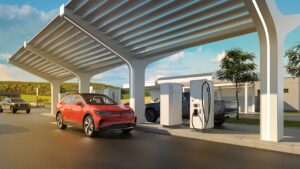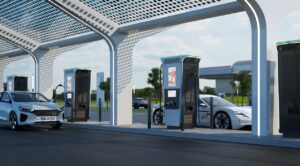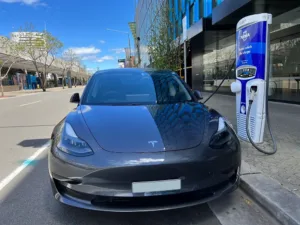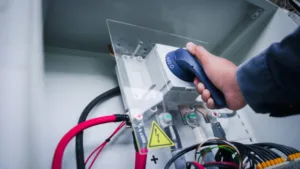Electric Vehicle Charging Guide: Options, Costs, and Rebates
Understanding Electric Vehicle Charging
Electric vehicles (EVs) offer a convenient and eco-friendly alternative to traditional gasoline-powered cars. Imagine never having to stop at a gas station again. Instead, you can charge your vehicle at home or at various public charging stations. For many EV owners, this is the reality, as battery electric vehicles (BEVs) and plug-in hybrid electric vehicles (PHEVs) significantly reduce or even eliminate the need for gasoline.
Types of EV Charging Stations
There are three main types of EV charging stations: Level 1, Level 2, and DC Fast Charging. Understanding the differences can help you decide which option best suits your needs.
Level 1 Charging
Level 1 Charging is the slowest but simplest method, perfect for overnight charging. It uses a standard 120-volt AC outlet, requiring no additional equipment. Most EVs come with Level 1 charging cables that plug into any standard outlet, making it an accessible option for home or work.
- Connector: Standard J1772 or Tesla (with adapter)
- Range Added: 3.5 – 6.5 miles per hour
- Ideal For: Daily commutes of 30-40 miles
Level 2 Charging
Level 2 Charging offers faster charging and is commonly found in public places, workplaces, and homes. It requires a 240-volt outlet, similar to what is used for an electric dryer or stove. Installing a Level 2 charger, also known as Electric Vehicle Supply Equipment (EVSE), may involve additional electrical work.
- Connector: Standard J1772 or Tesla (with adapter)
- Range Added: 14 – 35 miles per hour
- Ideal For: Faster home charging and public charging stations
DC Fast Charging
DC Fast Charging provides the quickest charge and is ideal for long trips. It requires a 480-volt connection, making it unsuitable for home use. Not all EVs are equipped for DC fast charging, so check with your vehicle manufacturer.
- Connector Systems: CHAdeMO, CCS Combo, Tesla Supercharger
- Range Added: Up to 100 miles in 30 minutes
- Ideal For: Quick charging along major travel routes
Cost of Charging Your EV
Home Charging Costs
Charging your EV at home is typically the most cost-effective method. Costs vary based on your local electricity rates and your vehicle’s battery size. Many utilities offer time-of-use (TOU) rates, reducing costs during off-peak hours.
- Average Cost: 16.58¢ per kWh in California
- Example: Charging a 40-kWh battery for a 150-mile range costs approximately $6.63
- Savings: Significantly cheaper than gasoline, averaging 4.42¢ per mile vs. 12.44¢ per mile for a 25-mpg gas vehicle
Public Charging Costs
Public charging stations offer various pricing models: free, pay-as-you-go, or subscription-based. Costs are determined by the network or property owner. Some manufacturers, like Hyundai, Nissan, and Tesla, provide complimentary charging.
- Example: One network charges $1.50 per hour for Level 2 and 26¢ per minute for DC fast charging
- Cost per Mile: Approximately 8¢ per mile for Level 2 and 9¢ per mile for DC fast charging
EV Charging Rebates and Incentives
Residential Level 2 Charging Station Rebates
Many utility providers and air districts in California offer rebates to help offset the cost of installing a Level 2 charging station at home. This can make upgrading your home charging setup more affordable.
Commercial EV Charging Station Rebates
Property owners can benefit from rebates for installing public charging stations, attracting EV drivers, and generating additional revenue. These incentives can significantly reduce the cost of purchasing and installing commercial chargers.
Notable Programs
- Anaheim Public Utilities: Up to $10,000 for DC fast chargers
- Burbank Water and Power: $5,000 for Level 2 or DC fast chargers
- Los Angeles Department of Water and Power: Up to $75,000 for DC fast chargers
State Incentives
The California Electric Vehicle Infrastructure Project (CALeVIP) offers substantial rebates for installing EV chargers, supporting both residential and commercial installations.
- Rebate Amounts: Up to $7,500 for Level 2 chargers and $80,000 for DC fast chargers
Conclusion
Choosing the right EV charging option depends on your driving habits and charging needs. Whether you prefer the simplicity of Level 1, the speed of Level 2, or the rapid charge of DC fast charging, there are numerous options and incentives available to make EV ownership convenient and cost-effective. Utilize available rebates and incentives to maximize your savings and enjoy the benefits of driving electric.






